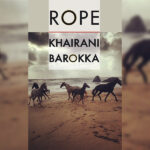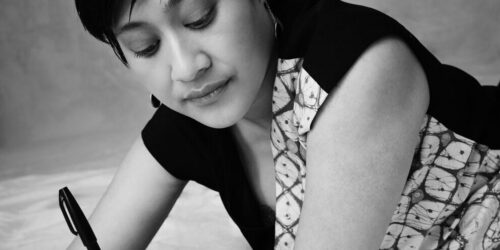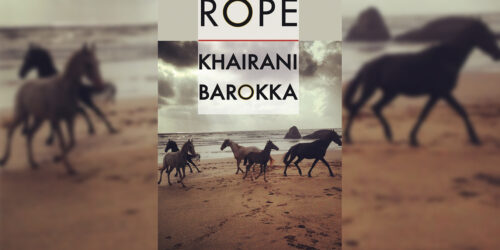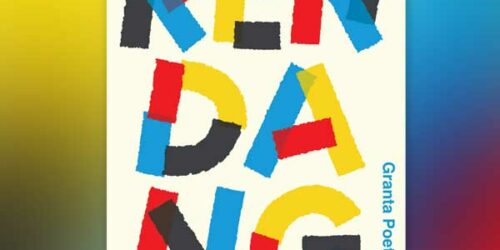
Over February and March our (virtual) NCW Book Club is Rope by Khairani Barokka. We hope you’ll join us in reading the book and joining the conversation – find out more about all the ways that you can get involved.
 Rope is notable for the rich, lyrical language that Khairani Barokka uses throughout the book to explore themes of place, environment, and travel. Even within short, lyric poems, Okka is able to evoke the sights, sounds, histories and feelings of a range of scenes and encounters. These are poems in which every word has been carefully selected to connect with the reader’s senses and create vivid, vibrant imagery.
Rope is notable for the rich, lyrical language that Khairani Barokka uses throughout the book to explore themes of place, environment, and travel. Even within short, lyric poems, Okka is able to evoke the sights, sounds, histories and feelings of a range of scenes and encounters. These are poems in which every word has been carefully selected to connect with the reader’s senses and create vivid, vibrant imagery.
Here we share a writing exercise inspired by Rope that we hope will open up further ideas for composing your own piece of writing, whichever form or genre you’re writing in. Let us know how you get on over on our Discord community. Happy writing!
Pool: pared-back scene setting
‘Pool’ is the opening poem of Rope and a brilliant example of paring a scene back to a few evocative details for maximum effect. In this exercise, you’ll take a similar approach to composition in order to write about a memory or photograph in either poetry or prose. Sometimes what we take out of a piece of writing can be as important as what we put in, so this exercise focuses on generating and editing out material.
- Choose a memory, photograph or image to write about. If possible, choose one that will allow you to write about place, people and action, to really help set the scene.
- Free write about this memory or image for ten minutes. You can set a timer, and during this time keep your pen moving on the paper without stopping. Don’t overthink what you’re writing, or worry about making it good. Just try to write down as much detail about the scene as you can. You might like to include basic details – what time of day is it? Who are the people? – and more evocative or emotive details – what did it smell like? How do the people feel or what might they be saying to themselves or each other? At the end of the 10 minutes, read back over what you’ve written, but don’t change anything yet.
- (Re)read ‘Pool’. The poem is only 38 words long and uses an abbreviated, impressionistic syntax. And yet Khairani Barokka packs in a huge amount of detail that helps to set the scene and orientate the reader. Make a list of the types of information we’re given in this poem. It might be useful to start with the 5 W’s – who, what, when, where, why? What type of language does Barokka use to convey this information?
- Return to your free write, and make a copy or type up what you have written. Then, start to take out words and even whole phrases that are weaker or not needed. Keep only the key details and most striking language. You can even try dispensing with ordinary syntax like Barokka does – what happens if you get rid of the conjunctions (e.g. and, but, so), articles (e.g. the, a, an) and even pronouns (e.g. I, they, we)? Think about why you’re keeping certain things in, and why you’re taking other things out.
- When you’re happy with the remaining words and phrases, you can try arranging them into a poem or prose shape. What happens when you play around with if and where you break the lines of your poem? Could this be the basis for a piece of flash fiction? Could you even integrate this piece into a longer work in progress, and what effect does this pared-back style create?
- You can repeat this exercise multiple times using the same scene and copies of the same free write. Can you pare your free write back to 100, 50, or even 38 words? Try putting your free write to one side for a while. When you come back to it, do different words and phrases jump out at you? What can you make with them?
Share your work with us! We’d love to read what you come up with. Join us on Discord or drop us a line on Twitter.
Discover more poetry by Kharani Barokka…
Join Khairani Barokka plus guest writers Vahni Capildeo, Rishi Dastidar, and Fitri Nganthi Wani, with translation by Eliza Vitri Handayani, to celebrate the publication of her second poetry collection, Ultimatum Orangutan. Book tickets here >>
You may also like...
Rope: Questions for readers
Khairani Barokka’s ‘lyrical, defiant’ first full poetry collection is our current NCW Virtual Book Club pick

26th February 2021
NCW Book Club: Rope by Khairani Barokka
Join us and share your passion for reading

5th February 2021
Book Club: RENDANG by Will Harris
Flo Reynolds introduces our latest Book Club read

17th September 2020






